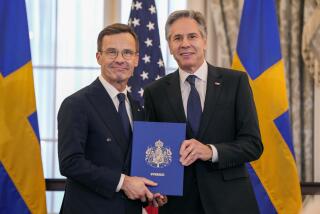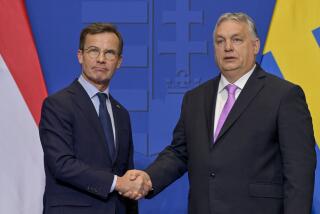He Helped Bridge U.S.-PLO Gap : Sweden’s Andersson: Master of Diplomacy
- Share via
LONDON — Swedish Foreign Minister Sten Sture Andersson, whose pivotal mediating role helped remove the final obstacles to a U.S.-PLO dialogue, has a reputation for bridging political divides.
The affable 65-year-old veteran Socialist politician once marshaled his skills against the United States, winning the support of even the most conservative Swedish political parties for a declaration condemning the American bombing of North Vietnam in the early 1970s.
“No one but Andersson would have been able to get all sides behind him on that issue,” declared Leif Gustafson, chief spokesman for Sweden’s Social Democratic Party and a longtime acquaintance.
Unerring Instinct
A colorful, lively politician in a country where such personalities are rare, Andersson combines an unerring political instinct with a warm, personable nature to cover delicate diplomatic ground.
He became foreign minister in 1985, steadied a problem-plagued Foreign Ministry and developed a friendship with Secretary of State George P. Shultz that was to prove crucial to his task as a mediator.
“He has a constructive way of thinking when he takes on a challenge,” noted Inga Lena Wallen, a political adviser in the Swedish prime minister’s office. “He likes to quote the Swedish proverb that you work best when the wind is against you.”
And Staffan Thorsell, a senior editor at the country’s largest circulation daily newspaper, Expressen, said of him: “He is a man of great personal charm. Because he has such a big happy smile, he can get away with just about anything.”
Andersson, who once worked as a Stockholm postman, spent most of his political career as a domestic power broker and election strategist for the dominant Social Democratic Party, which has ruled Sweden for 50 of the past 56 years.
Quickly Forged Links
As secretary of that party, he held one of the most highly politicized jobs in Sweden, but his position also took him abroad, and he quickly forged strong links with leaders of other socialist parties, including those in Israel.
Those who know him say that Andersson developed a special interest in the Arab-Israeli dispute.
While Swedish-Israeli relations cooled after then-Prime Minister Olof Palme warmly welcomed Palestine Liberation Organization Chairman Yasser Arafat to Stockholm in 1983, Andersson remained a strong supporter of the relationship between Swedish and Israeli labor movements.
But last spring during a visit to the Israeli-occupied West Bank, Andersson broke the usual mold of diplomatic visits there by meeting with prominent PLO supporters, in addition to more moderate Palestinians.
“He has always been a strong defender of Israel, but he could see the dangers of letting the Palestinian problem keep going,” said Gustafson.
Speaking at a news conference in Geneva on Thursday, Andersson said it was difficult to trace the start of his mediation efforts. But it was clear from his comments that Swedish attempts to find common ground intensified significantly at least three weeks ago.
“I think the most crucial event was the meeting with the Jewish personalities from the United States and the small group of people from the PLO in Stockholm a fortnight before Mr. Arafat came to Stockholm,” he told reporters.
Further progress was made last week when Arafat met with five prominent American Jews in the Swedish capital, Andersson said.
While no detailed account of the mediation efforts have been made public, it is believed that Andersson maintained close contact with Shultz and other Reagan Administration officials, while gently coaxing Arafat to agree to state his position in wording stipulated by the United States.
Helped Draft Statement
Arafat’s statement Wednesday, which was responsible for the U.S. decision to finally open direct contacts with the PLO, was believed to have been drafted with Swedish help.
“After the Stockholm meeting, we knew that it was possible to reach an agreement,” Andersson said.
Many Swedes were initially upset at seeing Arafat treated in Stockholm last week in a manner usually reserved for heads of state. There were also raised eyebrows when Prime Minister Ingvar Carlsson cut short a visit to France by one day for the event.
However, as Andersson’s role has emerged, the agreement is viewed as both a personal triumph for Andersson and a revival of Sweden’s role as an international mediator, a role that has been largely dormant since Palme was assassinated nearly three years ago.
More to Read
Sign up for Essential California
The most important California stories and recommendations in your inbox every morning.
You may occasionally receive promotional content from the Los Angeles Times.













